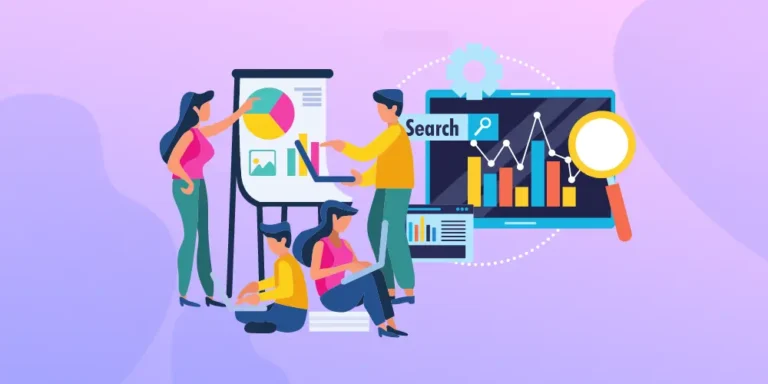ChatGPT is currently changing industries in a significant way, in particular, app marketing and ASO. This AI-powered technology can process larger amounts of data faster than humans, find patterns throughout various data, and offer practical recommendations for improving content. In theory, this approach speeds up and optimizes many workflows, but at the moment, it has drawbacks.
We tested ChatGPT for different ASO and app marketing tasks like ASO competitive research and keyword collection to determine whether you can delegate ASO to ChatGPT and how much you can rely on AI recommendations. In this article, we will overlook in detail how to use AI for different optimization stages, share effective prompts from Asolytics experts, and explain why you still need ASO services to get the best results.
Table of Contents
How did we test ChatGPT?
We imagined launching a fitness app to see how ChatGPT can help us do ASO and app marketing. For prompts, we used the “Fitness” app category, but you can put any other category into prompts’ variables, specifically for your app.
App Market Analysis With ChatGPT
Assessing the current market situation is the first step toward making the app more popular. Instead of manually searching for information, ask ChatGPT to conduct a market analysis with the prompt we had engineered. In the output, ChatGPT provided a simple fitness app market analysis with some useful insights about the potential revenue in this niche. Check it out:
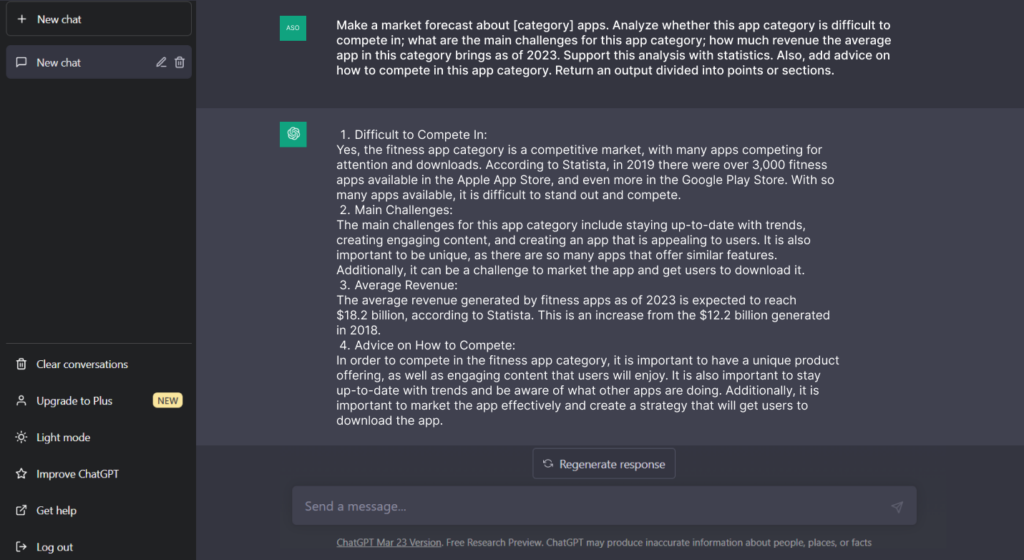
The AI predicted earnings in the “Fitness” category by referring to Statista data. Remember to verify all the numbers AI gives in an output — its database ends in 2021, so some information might be hallucinated by AI. The data in the sections “Main Challenges” and “Advice” is rather general, without specific recommendations for fitness app cases.
Pro tip: For a deeper market analysis and future ASO competitive research, ask the AI more precise questions, such as:
- What niches are the most promising in [app category]?
- Who are the biggest representatives/players in [app category]?
- How might the [app category] landscape change in the future?
Semantic Core Collection With ChatGPT
The semantic core collection plays one of the most important roles in optimizing text assets because well-chosen keywords make apps more visible and easier to find. It’s the next step toward app optimization. We asked ChatGPT to collect keywords for a fitness app by using the prompt:
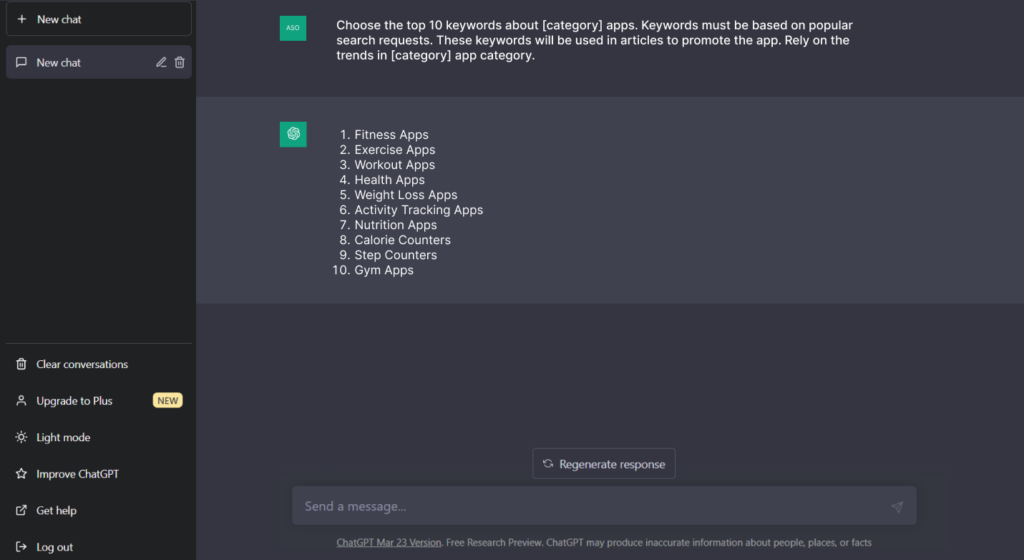
ChatGPT gave us the list of keywords you see above. All of them are related to health and sports, but at the same time, they are pretty general and highly competitive. That is one of the reasons why the use of ASO ChatGPT is not effective.
Does ChatGPT offer effective keywords? How to check it?
ChatGPT has some drawbacks that are critical for ASO. Its algorithms are based on a dataset that includes information up to September 2021. Knowledge about subsequent events, technologies, and trends is inaccurate and fragmented. Also, it doesn’t work as SEO services or search engines – it does not have full access to the internet. Taking into account that ASO services work with real-time app store data, we can’t expect ChatGPT to do the same. It can’t request data from stores – that’s what ASO services algorithms do.
For a successful ASO strategy, it is extremely important to work with up-to-date data taken directly from App Store and Google Play. That is why we recommend ASO services, such as Asolytics, to search for relevant keywords. Still, you can test the relevance of the keywords offered by ChatGPT using ASO platforms. Why not? Some of the keywords might be used to rank your app. Just add your app to the Asolytics Keyword Explorer and start analyzing.
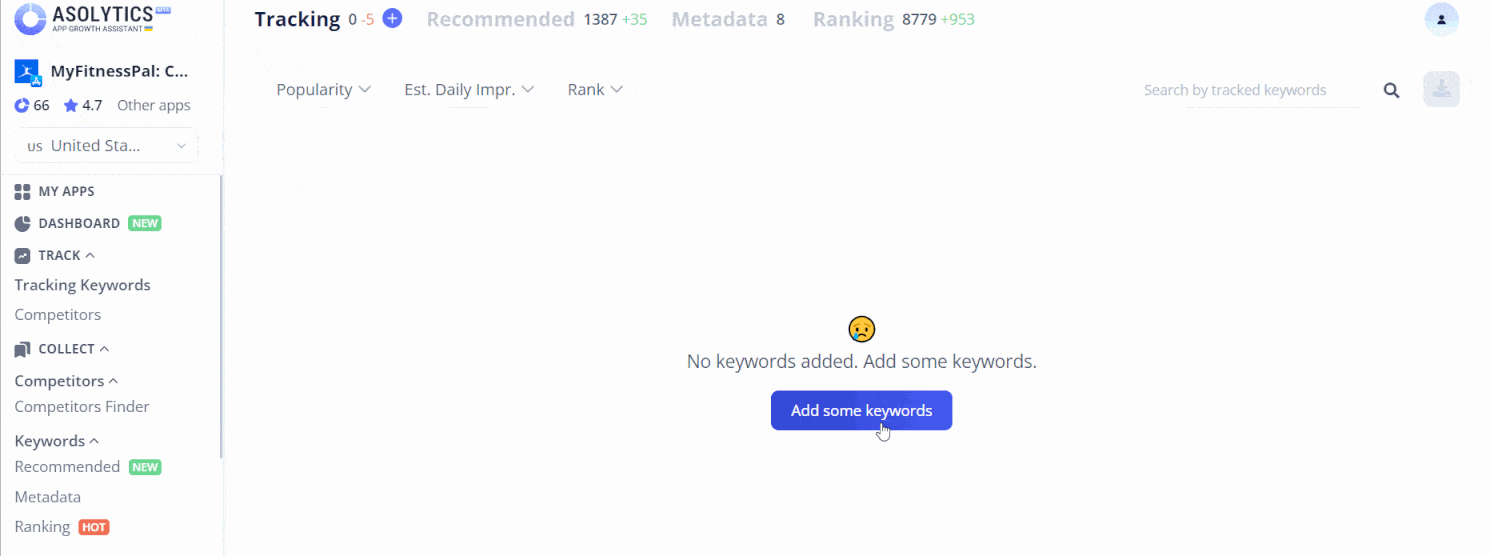
If your goal is to promote an app on the web pages, you can examine the metrics of the offered keywords with SEO services. While, in terms of ASO ChatGPT lacks possibilities of specialized services, it can still be applied to your in-app marketing (i.e., promotion outside the app stores).
Writing Texts for App Marketing
App promotion with ChatGPT, specifically marketing tasks outside the app stores, can be delegated to ChatGPT with more confidence than ASO tasks. This is because ChatGPT has no real-time access to the app stores. OpenAI databases are trained on web data by 2021 (as mentioned before). Thus, it can provide some valuable information about how to promote an app on the web as it was trained on the web data but not the app stores’ one.
To fasten your app marketing tasks, you can ask ChatGPT to give literally any kind of information you need. The request for marketing tasks varies depending on your goals, such as generating an Instagram post or creating a press release. Follow these rules to engineer a prompt for your specific purpose:
- Clarify what you need: Create a request describing what you want to get.
- Explain the context: Add as many conditions as you are aware of.
- Set rules: Limit the number of words, and set the tone of voice.
For example, fitness app marketers want to promote a new app feature on Instagram. The new feature allows synchronizing an app with Apple Watches so that users can get and track data about their heart rate, steps per day, and calories. Also, users can see its dynamics through particular periods. The feature is available for all subscribers throughout all subscription plans.
Based on these conditions, we have compiled the following prompt for ChatGPT, and it offered five options in the result:
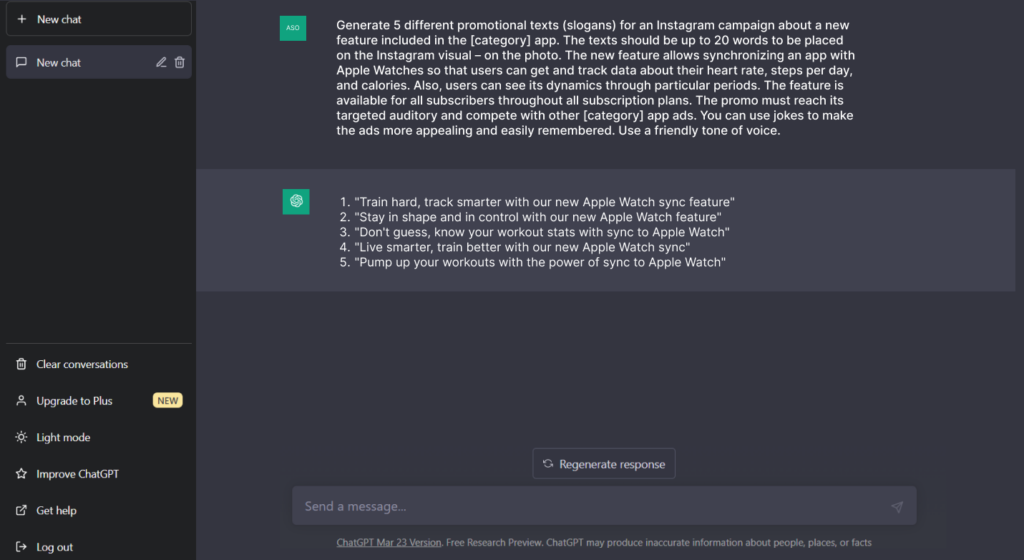
Use them exactly as they are, or ask the AI to refine them, making them more witty or funny. It’s a good idea to insert into your promotional texts keywords found by ChatGPT. We don’t recommend using the proposed texts without manual proofreading, as they might be different from the general tone of your campaign.
Pro tip: Write your own texts and ask the AI to improve, rewrite, or shorten them by following your specific conditions. For example, you can request ChatGPT to turn a slogan into a haiku, write the text acting like a kid, or use persuasive language.
App Promotion Tips and Tactics for In-App Features by ChatGPT
We discovered that ChatGPT can be helpful for brainstorming new ideas about in-app features and promotion tactics, in addition to generating and analyzing texts. For example, we wanted to get insights about which features we can add to the fitness app to make it more desirable for users.
Also, we were interested in whether AI can recommend some promotion tactics, specific to fitness apps. We used the following prompt:
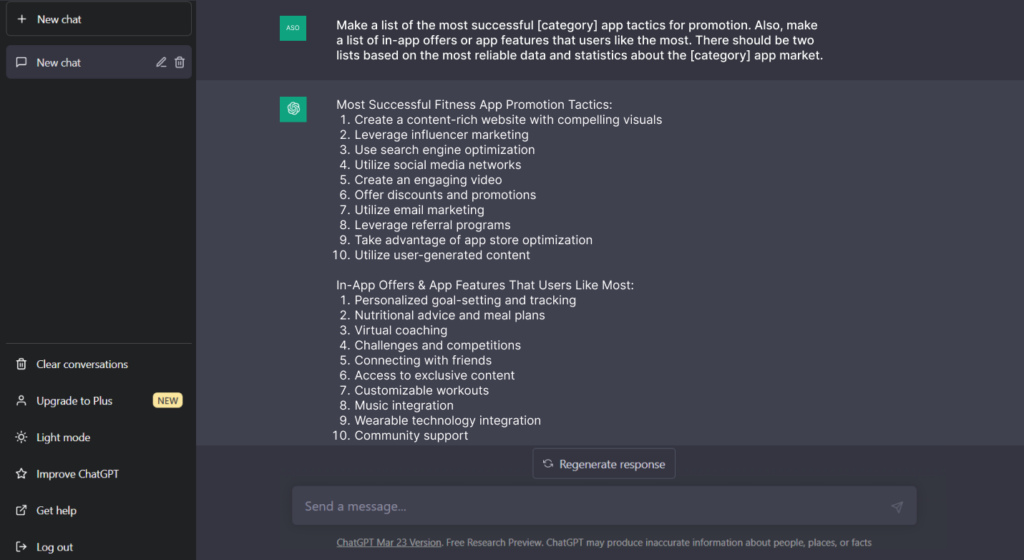
Pretty good work! We got a list of real promotion actions that are done by successful apps. We can apply them to the fitness app too. Also, by analyzing the fitness app market and conducting our own ASO competitive research, we can see that many apps implemented similar in-app features that were chosen by AI. Now we can focus on some of them and ask AI to develop the idea. For example, we can ask ChatGPT to describe how to implement virtual coaching (3) into the app step-by-step.
Pro tip: Use ChatGPT to find ways to solve a problem. For instance, if customers delete your fitness app a month after installation, briefly describe the issue and ask the AI to suggest solutions to improve retention.
Writing App Titles and Descriptions With ChatGPT
Now, let’s check how effective AI is in creating ASO texts. Text assets directly impact top app rankings by category algorithms in App Store and Google Play, so they should be written using the most relevant keywords. We already know that ChatGPT fails to collect keywords specifically for app stores as this AI technology lacks such algorithms.
Still, we can get help with ASO from AI and ask it to make up good texts. With efforts made in advance, we can give AI a ready-to-use list of keywords for the texts. That’s how you can skip copywriting. Let’s see.
App title
The name of the app in stores is one of the most significant assets on the page. When making it up, you need to follow App Store and Google Play guidelines, include relevant keywords, and consider trends and competition. To get complete app titles from ChatGPT, we decided to test different prompts. Two of them appeared to be equally good:


In the first case, we asked the AI to take into account the audience’s interests; in the second — market analysis. Respectively, we received two lists that are noticeably different from each other:


Choosing the best title might seem just a matter of taste. However, it’s not. To make an app more visible, keywords should be added to the app title. Considering this, choose the title to which keywords can be added in the most adequate way.
We have previously collected keywords for the fitness app with Metadata Tools in Asolytics:
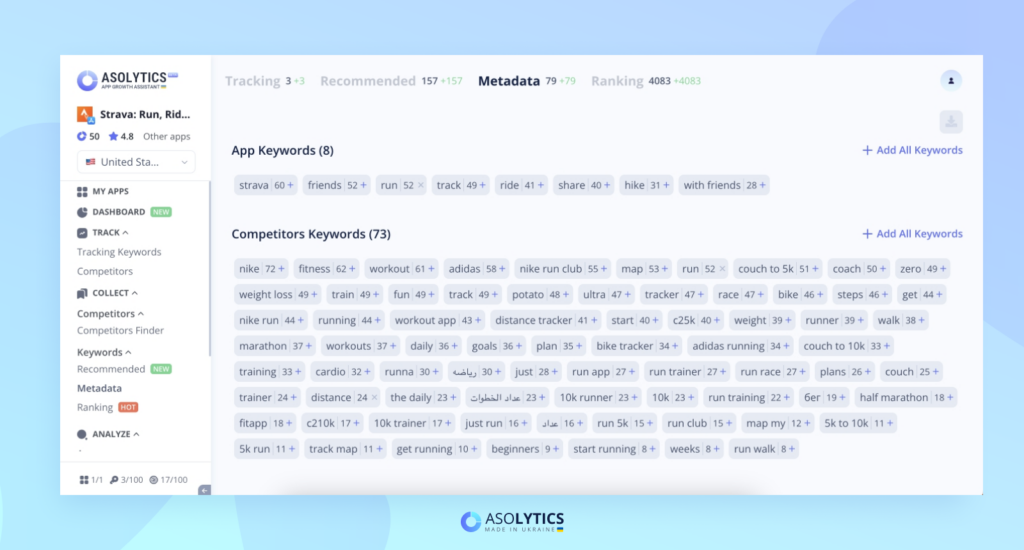
We can add these keywords to the titles we like. For example, we see that “FitTracker: Monitor Your Progress” (4), the title from the first list, already contains the keyword “tracker.” It’s a good idea to focus on this title and improve it with additional keywords: “FitTracker: Monitor Your Workout.”
Pro tip: To make your own prompt for titles with keywords, you can prepare a list of keywords using Asolytics tools and conduct ASO competitive research and then ask ChatGPT to generate titles including the keywords from that list. Just add that list to the prompt. You can also ask AI to keep this title pattern: [brand/app name] + [keyword].
App description
For this, we’ve collected keywords in Asolytics’ Metadata tool and got the list of keywords based on the chosen fitness app’s competitors.
Then, we used the prompt with those keywords added instead of the variable. In the output, we received two descriptions and chose the one you see on the screenshot:
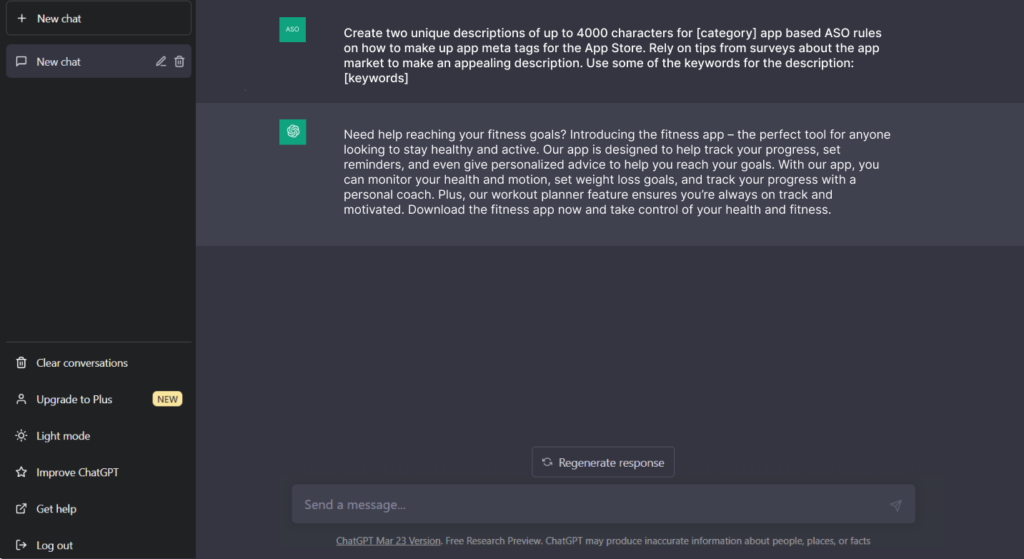
Although the text contains keywords and generally meets our request, from our experience, we know that they can be improved by replacing some parts of the text with more specific vocabulary or adding some features describing a particular app.
Pro tip: To make your description more specific, ask the AI to use lists and subsections, be “friendly” or “persuasive”, and stick to a specific style (like John Tolkien or Wired Magazine). For example, we asked ChatGPT to rewrite the description we got in the style of John Tolkien. This is what AI made:
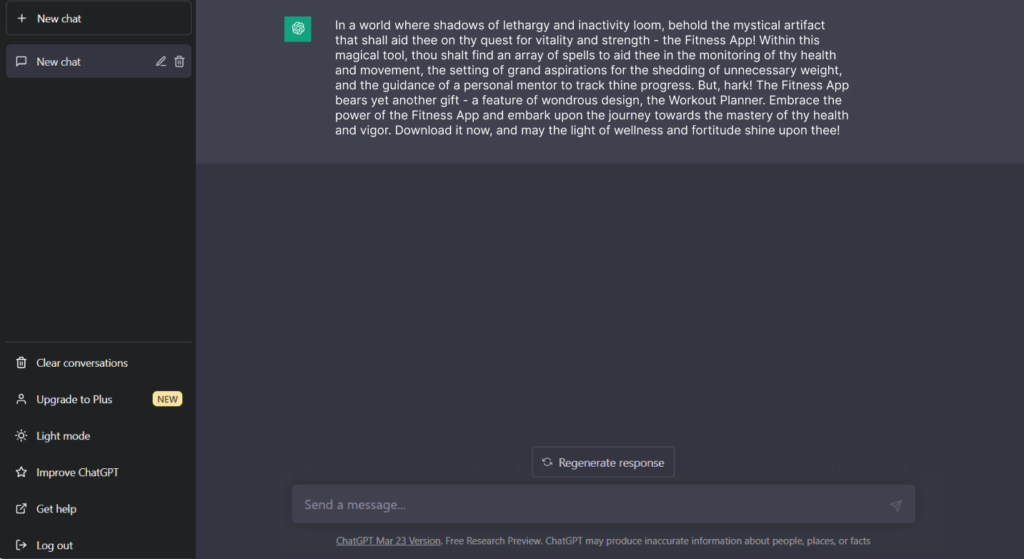
This description should be shortened due to the app stores’ requirements. However, for those who decided to create a fitness app in some specific style, it’s a fast way to receive a creative copy that can be edited later.
Writing Answers to Users’ Comments With ChatGPT
Review management is vital in ASO to develop user loyalty and retention and create a good impression. Unlike writing titles and descriptions, it requires more regular follow-up and responses to both negative and positive feedback. To write replies to reviews with ChatGPT, use the prompt below.
We asked the AI to generate a response to the user’s comment left on the fitness app page,
“Good app, but the subscription is too expensive, and the plans are limited.”
ChatGPT offered the following answers:
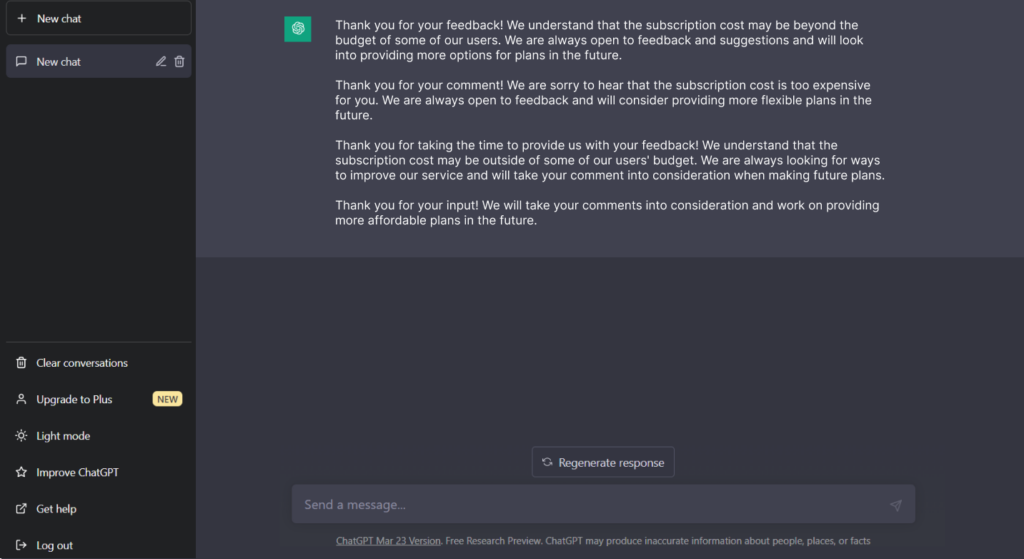
You can do the same by using the prompt:
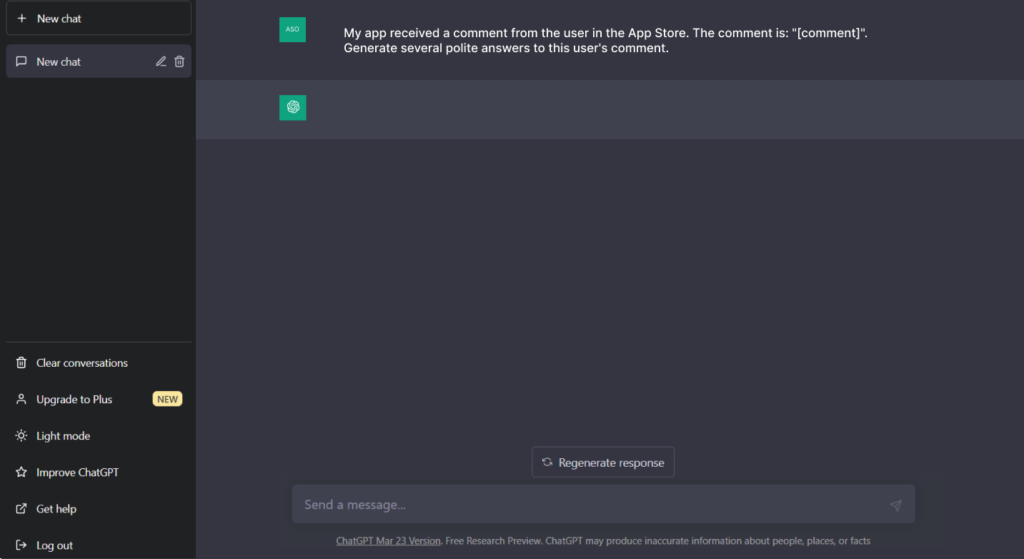
The key disadvantages of these AI-generated answers are the lack of personalization and keywords. The latter is especially important for Google Play, as the store’s algorithms rank developer’s responses. Therefore, we recommend you search for suitable keywords using Asolytics Keywords tools and ask the AI to include them in the response texts – in a similar way as we did with titles and descriptions.
Pro tip: You can use ChatGPT to look for patterns in user feedback. Copy several comments and ask the AI to analyze them and find common things, for example, what customers like or dislike. You can use ChatGPT in the app marketing, outside of app stores, to analyze any feedback about your brand or product.
ChatGPT vs Asolytics: Which Service Perform ASO Tasks Better
Now you know the main use cases of ChatGPT for app promotion and ASO. This language model can automate many steps and speed things up in terms of app marketing. However, its use specifically for ASO is currently limited, which is essential due to OpenAI algorithms. The main challenges (in terms of ASO) are the following:
- outdated knowledge base (September 2021);
- data based on the Internet, not app stores data;
- errors in facts and “hallucinations”.
With knowledge of programming languages and the use of plug-ins and extensions, ChatGPT capabilities can be expanded, thereby reducing the impact of disadvantages. This chatbot was not developed as an app optimization solution, so it’s not recommended to do ASO with ChatGPT only. For ASO, it is best to use specialized services. For example, free ASO tools:
- pull information directly from app stores;
- work in real-time;
- help select the most relevant keywords;
- show keyword statistics and changes in popularity, ASO ranking factors, and impressions;
- allow you to monitor changes in the parameters with the Tracking Keywords tool, and more.
You can mix both AI and ASO services’ approaches. Build a semantic core with Asolytics’ keyword search tools and ask ChatGPT to compile the text assets you want with them.
Tips for ASO Competitive Research with ChatGPT
Based on our experiments with ChatGPT, we have come up with a few rules to follow to get the most relevant responses from AI:
- Be brief. Your prompts should be clear and to the point. Avoid vague phrases, as ChatGPT might have trouble interpreting them. If you have several questions, divide them into parts and ask them one by one.
- Give context. For ASO, it is critical to consider the characteristics of the target audience, market, and competitors. For the AI responses to be relevant, give it more information to understand the context.
- Test ChatGPT knowledge. If you want a short app description that can be published on Google Play, ask first if ChatGPT knows what it is and then request a text.
- Keep your language simple. We do not recommend using professional jargon and slang when writing prompts. Your requests should be easy to read and understand.
The last and most important rule: ChatGPT cannot replace the work and creativity of ASO professionals and specialized tools. When optimizing app page assets, we recommend using AI as an assistant that can come up with good ideas for app marketing. But do not completely rely on it when making ASO.


